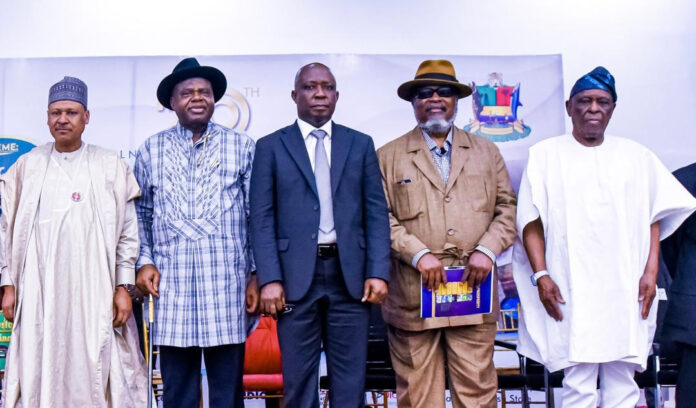President Bola Tinubu has said that Nigeria’s economy is gradually making a rebound, attributing the progress to sustained reforms being implemented by his administration across various sectors.
The President stated this while delivering a keynote address at the opening ceremony of the All-Nigerian Editors Conference, in Yenagoa, Bayelsa State,
Speaking through the Minister of Information and National Orientation, Mohammed Idris, President Tinubu stated that he has spent the past eighteen months establishing the groundwork for his vision for a prosperous Nigeria.
“I am pleased to let you know that through our sustained reforms, we are witnessing our economy gradually making a rebound on the most important foundational level. Today, our debt service to revenue ratio has come down drastically from almost 100% to about 65%.
“The last eighteen months have been spent laying the foundation for this compelling vision of a prosperous Nigeria. That is what the Renewed Hope Agenda is all about – rekindling the faith and hope of all Nigerians in the ability of their country to flourish and to in turn provide an environment that allows everyone in it to flourish just as much.
“But we realise that there are some major obstacles standing in the way of the full unleashing of Nigeria’s abundant potentials. And we have spent time and energy and focus boldly tackling these.
“Two of the most significant are very well known to you: a ruinous fuel subsidy regime that deprived us of billions of dollars annually that could be going into investments in critical physical and social infrastructure, and a foreign exchange regime that was prone to unimaginable levels of arbitrage and abuse. Like the fuel subsidy, another needless drain on our limited national resources, and a cap on our ability as a nation to reach full potential,” he said.
He stated that, as a result of the reforms, revenue for all three tiers of government – Federal, State, and Local – has grown significantly, which has enabled greater investment in social services, infrastructure development, and social security.
The President noted that the Supreme Court’s decision to grant local government autonomy, following a suit filed by the Federal Government, was aimed at strengthening governance at the local level and fostering grassroots development.
Addressing the theme of the conference, “Economic Growth and Development Strategies in a Resource-Rich Country,” President Tinubu stated that the longstanding question of how Nigeria can transform its vast resources into meaningful growth and development has driven his vision for a nation that fulfills its potential.
He emphasized his commitment to a Nigeria where no citizen is left behind in poverty or disease and that commands respect on the global stage.
“A new minimum wage of N70,000 has taken off across all federal government establishments, with many of the state governments committing to implementing same. Over 46,000 students are benefiting from the Nigerian Education Loan Fund across 59 tertiary institutions with a disbursement of over N5 billion. The first batch of 500,000 civil servants is set to become beneficiaries of the Consumer Credit Scheme with the release of N100 billion.
“While oil remains a significant source of revenue for Nigeria, we are investing heavily in other sectors to diversify our economy for sustainable growth. The launch of the Presidential Initiative on CNG is a deliberate strategy to harness our abundant gas resources to bring down the high cost of transportation by about 60% and also foster a clean and healthy environment for our citizens. This initiative has unlocked close to $200 million in private sector investments in the last one year,” he said.
President Tinubu outlined several key initiatives being implemented by his administration to provide economic relief to Nigerians such as the Presidential Loans and Grants Scheme, the Consumer Credit Corporation Initiative, the Renewed Hope Housing and Estates Initiative, the Renewed Hope Infrastructure Development Fund, and the Presidential Unlocking Health Value Chains Initiative, among others.
He said each one of the initiatives is designed to be a targeted intervention that will deliver sustained results in the lives and livelihoods of tens of millions of expectant Nigerians.
While hailing the media for its dedication to nation-building, particularly in supporting Nigeria’s enduring democracy, President Tinubu emphasized that the roles of government and the media are closely linked, both vital to serving the public interest.
“And of course, the media has a duty to hold elected and appointed officials accountable and ensure that we are doing our work in a manner that strengthens democracy – not weakens it. That important work and must be done in a spirit of mutual respect and collaboration, not recrimination and opposition; this alignment enables us to achieve common goals that benefit society at large. Indeed, our roles are most effective when they are not adversarial but cooperative,” he said.

